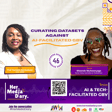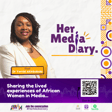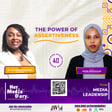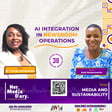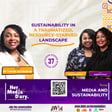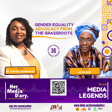Become a Creator today!Start creating today - Share your story with the world!
Start for free
00:00:00
00:00:01

SPECIAL SERIES: Labour Migration Reporting Ep 3: Experiences of women who migrate for work
This podcast series looks at labour migration in Africa and focuses on how women experience it on different levels. It highlights how African women experience labour migrations locally, regionally and internationally; featuring expert analysis and tips for journalists who report on labour migration issues.
In this episode we discuss:
- The experiences of first- and second-generation African migrants who started businesses in the US and the UK
- Migration that occurs within countries termed developing countries with Oreva Olakpe, a research fellow at CERC in Migration based at Ryerson University, Canada
- Using Wikipedia to boost the visibility of African women, with Shola Olayin of Wikimedia Nigeria
Hosted and produced by Andy Mkosi for African Women in Media
Read the labour migration newsletter that looks into the effect of the pandemic on migrant workers and offers story ideas for journalists here
Transcript
Introduction to African Women in Media Labor Migration Podcast
00:00:00
Speaker
Welcome to the third episode of the African Women in Media Labor Migration Podcast, a four-part series contextualizing labor migration on the continent.
00:00:20
Speaker
African women in media is an international NGO with a vision that one day African women will have equal access to representation and opportunities in media industries and media content.
Exploring African Women's Labor Migration Experiences
00:00:32
Speaker
Episode three takes a broad look at labor migration experiences of women who migrate within the continent and those who migrate internationally.
00:00:47
Speaker
Alesi Momwanga has over eight years of experience working in management consulting and stakeholder relations between government and the private sector. She led a pilot research study to showcase the economic and social impact of entrepreneurs migrating from Africa. She shares some of her findings.
Brain Drain and Entrepreneurship Among African Immigrants
00:01:07
Speaker
Basically, it was a study that I did to really see if, well, firstly, the loss that Africa has based on the studies that have shown that there's a lot of brain drain from Africans migrating to other developed countries like the US and the UK.
00:01:32
Speaker
But looking at it as a perspective from entrepreneurship in terms of how many of these young Africans that are second- or first-generation immigrants or second-generation immigrants, meaning that their parents moved to those countries and they then obviously, you know, grew up, they were born there, educated there, and what
00:01:59
Speaker
what moved them to start a business and why did they start a business and the ease of doing business there as opposed to doing a business in Africa and if they also do business transitionally between those countries.
Self-Employment in the US and UK: A Focus on African Migrants
00:02:14
Speaker
So it basically was a study of Africans in the U.S. and the U.K.
00:02:18
Speaker
Well, the main countries of focus was obviously Kenya, Nigeria and South Africa because those are the main people that you do find migrating to the US and the UK. And a lot of the and the types of businesses obviously were people that had been operating for between, you know, five years or less.
00:02:43
Speaker
And most of them, obviously, well, the results found most of them were mostly self-employed or were in the services industry, which makes a lot of sense because, particularly with Nigerians, where you'll find a lot of them in Houston, in the States, and obviously a lot of Africans in the UK, in London, mostly.
00:03:04
Speaker
So they're mostly based in close enough to big cities. A lot of them studied, they are graduates, professionals, they did work, and then they decided that they wanted to venture into their own thing, which obviously is not very common with a lot of first generation immigrants, because you pressure them to staying in the working world, you pressure to staying into the system.
00:03:30
Speaker
If you actually come out of, this has to be kind of seen as a rebel.
Changing Trends in Remittances from Migrants
00:03:34
Speaker
Muanga says the culture of migrants ascending money home will gradually die out over the years, as the second and third generation of migrants choose different ways of navigating the world. Africa is going to use trillions from that, but also skilled labor, because a lot of them don't see themselves necessarily coming back. Some of them do want to come back.
00:03:54
Speaker
But a large proportion don't necessarily see themselves coming back. A large proportion also see themselves trading in between countries.
Challenges in African Manufacturing and Transportation
00:04:05
Speaker
They see themselves being the bridge and the gap between the developed world and developing countries, which is probably something that we need in terms of for economic developments. But then one of the things that they did mention was the constraints of trying to do business in Africa.
00:04:22
Speaker
One of them also is the fact that it's very difficult to transport goods in Africa. It's actually really expensive to even transport goods in between countries or regions in Africa as opposed to other parts of the world. It's also really expensive to produce locally as well because of labor.
00:04:47
Speaker
And also because we don't necessarily have ways of manufacturing locally yet. And so what happens is that the price of the output ends up being too expensive for the locals in any case. And so they don't necessarily have the market locally as opposed to internationally. And so you see it all the time with Africans leaving the continent seldom do they come back, not really.
00:05:16
Speaker
unless they really identify that huge opportunity for them to do that. So yeah, it was interesting talking to the people that I spoke to that were based in the UK and the US. It also made me think about my experiences as well. And it's funny that I'm literally doing pretty much the same myself, but obviously in the African context. So it would be interesting to also find out from other Africans in terms of
00:05:43
Speaker
the same study in which African countries they've migrated to and if it's improved their lives in a certain way, whether it's in business or in their professional life. Because I think most African countries are developing quite rapidly.
00:06:02
Speaker
I think in a few more years we're going to have other African countries that are doing really amazingly well. I mean, Ghana is really, you know, doing amazing things. And it's funny because a lot of the diaspora from Ghana, from America coming back home, they had this whole come back home movement last year.
00:06:23
Speaker
So I'm really excited to see What the future holds for the continents really exciting and what we need though is just leadership Really?
Fostering Growth Through Local Investment and Leadership
00:06:34
Speaker
It's leadership. It's it's it's you know people that are investing back into the continent whether it's through your skills your business you actually like because we've got this culture of get I don't want to say get rich quick schemes, but
00:06:53
Speaker
There's so many different elements, I guess, to contributing and to growing this continent. And it's going to take a few people that really want to do the work to get us there. And it starts with leadership. It starts with people investing more in local talent, local businesses.
00:07:14
Speaker
It also requires us to buy from our own. And I think the more people say it and the more we actually do it, as opposed to just saying it, the more we'll see the difference that we require. I'm glad it's happening. It's sad that it's only happening now because
00:07:30
Speaker
you know, developed countries have now endorsed certain aspects of Africa and so now we find it cool and that's what we always wait for. Why must we wait for that before we endorse ourselves and you know, start consuming our own and producing our own stuff.
South-South Migration: Historical and Economic Impacts
00:08:01
Speaker
Orevah Olagpe is a doctoral researcher in the Law Department of the School of Oriental and African Studies, focusing on South-South migrations and third world approaches to international law. South-South migrations would refer specifically to migrations that are occurring between countries that are termed developing countries, countries that are, there's a certain kind of
00:08:29
Speaker
background. It's a long background surrounding the definition of what developing countries are or what the global south is versus the global north. So it's basically countries that are within Africa and Asia and other some other parts of the world that fit into certain economic and
00:08:56
Speaker
not only economics, but in relation to the power differences between rich countries and poorer countries. So poorer countries or countries that have been shaped by a history of imperialism or colonialism are referred to as countries in the global south.
00:09:15
Speaker
Areva shares with us some insights inspired by her views on what the future of migration could possibly look like.
Pandemic Challenges for Undocumented Migrants
00:09:22
Speaker
There are many angles. A lot of people have focused on how it's going to shift power between different countries, like I read articles on foreign policy talking about how China is going to become a greater power after the pandemic.
00:09:41
Speaker
And there were articles where people predicted that there's going to be greater hostility towards migrants, which I see that because of the way the virus was spread. It's spread by travel, so people might not be very, look very kindly to people who are constantly on the move. And also, it's going to, particularly focusing on my area of interest,
00:10:11
Speaker
it's going to make undocumented people more visible, right? Because in many countries, COVID prevention measures involved identifying people because you have to trace people. You have to ask them their travel history. You have to ask them where they stay, who they're staying with. You have to know so many details about individuals in order to chart a map of where they've been and to know whether they've been exposed to
00:10:40
Speaker
the virus. And because of that, it makes people who don't have papers to be more visible. And when they are more visible, they will be targeted more than before. So I think it's going to create greater risks for people without papers.
00:11:03
Speaker
And the risks include lower access to certain amenities. For example, in China, a lot of people could not get accommodation because they were pushed out of places they were staying just because they were African. And people were like, oh, Africans are carrying the virus. So they all got kicked out of their housing. And when you have no place to stay, you're exposed to a lot of
00:11:31
Speaker
of threats like health risks are involved, forced labor because suddenly you are desperate for a source of
00:11:41
Speaker
of income so that you can look for a place to stay. In places like Latin America, there were documented accounts of women being trafficked for sex, increased level of human trafficking because of the pandemic. Going forward, I think that we're going to see more of these things because governments are going to be focused on
00:12:11
Speaker
health and because they're focused on health and they're focused on borders and migration so migrants are going to be, migration is going to be a very hot topic.
The Visibility Project: Representing African Women on Wikipedia
00:12:31
Speaker
Head of Wikimedia Nigeria, Shola Olaniyan and Aum are collaborators on the Visibility Project. The project focuses on the visibility of African women on Wikipedia. Dr. Shola elaborates. We started by training students in secondary schools on how to use Wikipedia. So it was followed by a program called the WikiLoves Africa. And in that year, that was in 2014, 2015,
00:13:02
Speaker
The theme for the year was adornments. So we'll actually, the Wikilose Africa is an annual online event where we try to promote African culture, African context, a knowledge base in Africa, among all Wikimilians within Africa. It involves writing context,
00:13:31
Speaker
It involves training and also working with partners that can provide content for such. And after that, we worked with a program called the Wicked Love Swimming. Wicked Love Swimming is also a part of our programs that focuses on promoting women, especially in Africa. Because if you've been following us,
00:14:01
Speaker
There have been so many statistics about how women are not properly featured on the internet. And the WikiLeaks of Women is also one of those campaign that was used to improve the numbers of African women that we have on Wikipedia. And so we have done quite a lot. Time would not permit.
00:14:27
Speaker
but that's what we have done. And the last thing we did that was quite regional was the hosting of Wiki in Daba, which is the regional conference that involves all African Wikimedia. It's coming together. We didn't want shelter to discuss about the future of Wikipedia and Wikimedia projects in Africa. So that is what we have done so far.
00:14:53
Speaker
time will not permit me to say so much about what we have done, but that's what we've been so far. The Visibility Project was conceptualized between the African Women in Media and the Wikimedia and Nigerian Foundation. I shared a story about it yesterday, how it all came into reality, you know, tweeted through the Wikimedia and Nigerian Foundation Twitter Landu, and I mentioned
00:15:22
Speaker
I flagged some statistics which are quite damning to the image of women, why we should be having less than 2,000 women on Wikipedia compared to over 100 million women that we have in Nigeria. So Dr. Yamasi,
00:15:43
Speaker
replied, reacted to it, and she invited us for further discussion. And that was what led to Visibility Project. So Visibility Project is a drive. Dr. Shola says the core idea of the collaborations between AUM and Wikimedia Nigeria is to empower women and make sure their work is visible on media platforms. Those are two key goals. As Elia mentioned, I said
00:16:11
Speaker
It involves the disability project involves training, mentoring, and content development. So for us to achieve all the three mentions, key role, task, we engage with comedians to train, to mentor, and also to guide the selected participants on how to create content.
Expanding African Women's Stories in Major Languages
00:16:41
Speaker
And we have done it in such a way that it involves around Africa. So it's not just about Nigeria. It's not just about Wikimedia and Nigeria. The first, the meeting edition that started that we did in Attach B in May or March this year, it involves Wikimedia athletes in Tanzania, Uganda, and Nigeria. And we train
00:17:09
Speaker
over 200 African women journalists. So the one for the labor migration in Africa is a step further, because that one only focus on English language and Swaili, if I'm not mistaken. And this one is more of, we focus on more of, do I call it, I don't know, global language, like the English,
00:17:40
Speaker
We focus on Arabic and French. So it's involved around three major communities in Africa, the Anglophone, the Francophone, and the Arabic community.
00:17:59
Speaker
So it's quite big, and though the number of participants expected this time around is 100, and it's going to last for three weeks, people are expected to focus on
00:18:15
Speaker
African women within the space of legal migration in Africa that are doing quite well, that have been the crusader within this space. So that's what it's all about. We identify those women and we write articles about them.
Wikipedia Notability Challenges for African Media
00:18:32
Speaker
I mentioned two key factors yesterday which actually affects the Wikimedia's in Africa and also the
00:18:44
Speaker
media practitioners in Africa. So I talk about notability. For us to have a standalone page on Wikipedia, for us to have a biography on Wikipedia, it must be notable. And notability within the Wikimedia community is
00:19:10
Speaker
The definition is not the same, not is quite, is not that similar to the way we define it in probably on the internet generally, because notability on Wikipedia is determined by consensus among
00:19:38
Speaker
community within a Wikipedia project. So once it is decided that for us to have, for example, for us to have a media practitioner on Wikipedia, social pressing must have probably have a story published on three mainstream media platforms. So
00:20:07
Speaker
The definition of a mainstream media platform might differ from one claim to the other. So the issue of applying some of this consensus to horse in Africa as one of the reasons why quite a large number of what we
00:20:28
Speaker
refers to as reliable source might not be acceptable on Wikipedia as reliable source. So when a reliable source is not accepted, we are bound with the challenge of not permitting a page to be created on Wikipedia.
Partnerships and Social Media Engagement for the Podcast
00:20:55
Speaker
Thank you so much for joining the third episode of African Women in Media label migration podcast. Please keep the conversation going on social media on Twitter. We are at real our Facebook African women in the media, Instagram African women in the media till the next episode.
00:21:15
Speaker
This is a limited podcast series in partnership with the Joint Labor Migration Program, the African Union Commission, International Organization for Migration, and the International Labor Organization.





